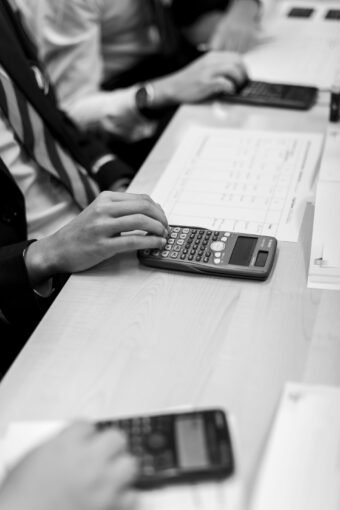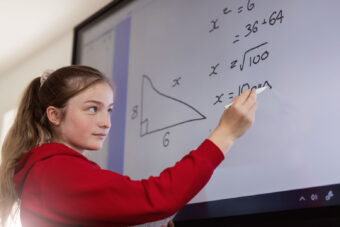
SQA qualifications in Mathematics are required or desirable for courses such as Mathematics, Sciences, Accountancy, Law, Finance, Computing & IT, Architecture, Engineering Sciences and Teaching (Mathematic). Careers in banking and the actuarial profession require mathematics as well as those engaged in statistical or operational research.

S1 and S2
The Curriculum for Excellence 3rd and 4th Level course aims to further develop pupil skills in Number, Money, Measure; Shape, Position, Movement and Information Handling. Throughout the course, various topics are covered and pupils take part in individual, group and paired tasks. An investigational approach is given to some of these topics.
Throughout the course, pupils can expect to work on Integers, Angles, Types of Number, Scientific Notation, Algebra, Decimals, Statistics, Percentages, Areas, Circle, Fractions, Scales & Drawing, Ratio/Proportion, Equations/Inequations, Time, Linear Patterns, Money and Pythagoras’ Theorem.
Numeracy and Problem solving are embedded into the course along with appropriate assessment. Meanwhile, pupil work is monitored continuously.
National 4 and National 5
National 4
As part of the course, pupils develop their ability to understand and apply straightforward mathematical skills in algebra, geometry, trigonometry, and statistics. Pupils use mathematical techniques and reasoning skills to solve mathematical problems, which are based on real-life situations. The course helps pupils develop skills in how to use mathematical language and explore mathematical ideas which helps them gain confidence in problem-solving, analytical skills, accuracy and interpreting, communicating and managing information in mathematical form.
National 5
The National 5 course develops pupils’ ability to understand and apply mathematical skills in algebra, geometry, trigonometry, and statistics. They are challenged to simplify and solve problems; select and apply mathematical techniques to real-life contexts and make connections and informed predictions. Pupils will use mathematical language and explore mathematical ideas. They will develop resilience and confidence in problem-solving; analytical and evaluative skills; interpreting, communicating and managing information in mathematical form.
Higher
Mathematical rigour and the ability to use precise and concise mathematical language assumes a particular importance at this stage. Candidates who complete the Higher Mathematics course successfully are expected to have a competence and a confidence in applying mathematical techniques, manipulating symbolic expressions and communicating with mathematical correctness in the solution of problems.
The course has obvious relevance for candidates with interests in fields such as commerce, engineering and science where the mathematics learned will be put to direct use.
Advanced Higher
The Advanced Higher Course extends pupils’ mathematical knowledge in algebra, geometry and calculus. It includes matrix algebra, complex numbers and vectors and formalises the concept of mathematical proof.
Advanced Higher Mathematics emphasises the need for pupils to undertake extended thinking and decision making, to solve problems and integrate mathematical knowledge. The course offers candidates, in an interesting and enjoyable manner, an enhanced awareness of the range and power of mathematics.
Curricular Activities and Extracurricular Clubs
Excursions are organised where applicable and in 2016, one such opportunity presented itself with the construction of the Forth Replacement Crossing in Edinburgh. S5 and S6 Mathematics and Physics pupils visited the Forth Replacement Crossing Exhibition Area in an interdisciplinary excursion to South Queensferry. The facility not only affords an unsurpassed view of the Queensferry Crossing which, at the time, was in the initial stages of construction, but it also offers an excellent educational environment for secondary pupils. Wellington pupils took part in Science, Technology, Engineering and Mathematics challenges.
Pupils from every year group part in the Scottish Mathematical Challenge, a problem-solving competition for individual pupils in Scottish secondary schools and upper primary schools.